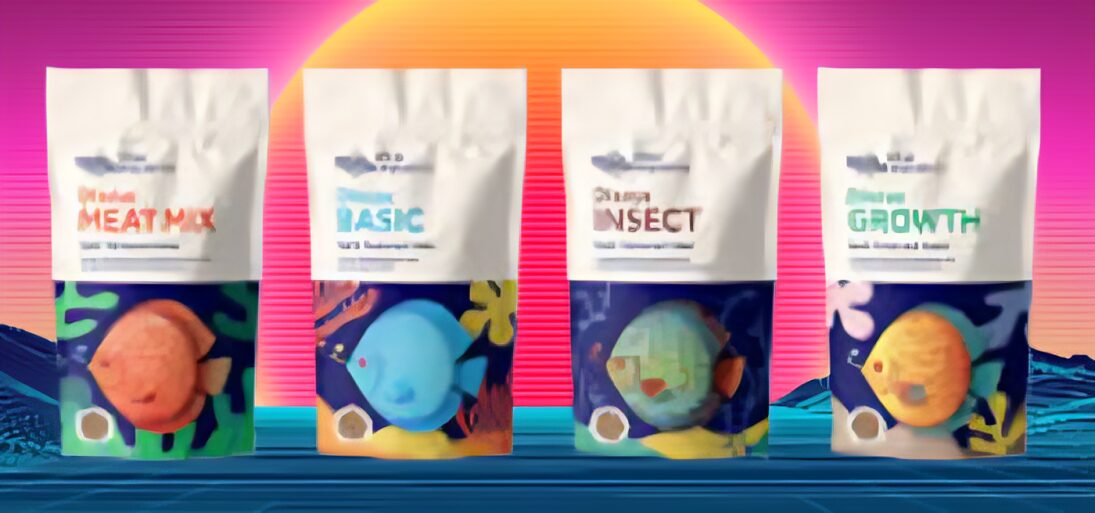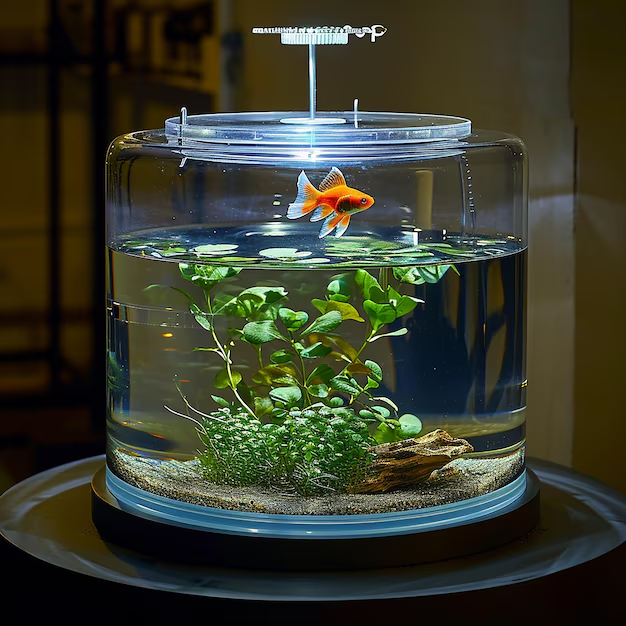
Our varieties of aquatic feed products are displayed against a vibrant sunset background, showcasing a range of options for fish care.
Proper nutrition plays a pivotal role in the health and vibrancy of aquarium fish, offering essential nutrients for growth, immune support, and longevity. Choosing the right diet is crucial to meet the diverse needs of species like goldfish, catfish, and exotic varieties. This guide dives deep into the types of fish food, health benefits, feeding tips, and essential products to keep your aquarium pets in top condition.
Understanding Different Types of Fish Food
Aquarium fish have specific dietary needs that vary based on their species, age, and habitat. Here’s an overview of the most common types of aquatic nutrition available.
Flakes
Flakes are versatile and suitable for a wide range of fish, especially surface feeders like goldfish. These are formulated with a mix of proteins, vitamins, and minerals. They float on the water’s surface, making them easily accessible for fish that prefer to feed at the top.
Pellet
Bulk pellets are popular for larger fish and bottom feeders, providing a compact form of nutrition. They’re available in floating or sinking types, depending on your fish’s eating habits. Pellets often contain high protein content, making them suitable for species requiring more substantial diets.
Frozen and Live Options
Live food and frozen options like brine shrimp are excellent for exotic fish that thrive on high-protein diets. These options mimic natural prey and are ideal for tropical and marine species. Live nutrition can enhance the growth rate of juvenile fish and improve overall vitality.
Tropical Varieties
Tropical fish, including live and freeze-dried varieties, benefit from nutrient-dense foods that support their vibrant colors and active lifestyles. These options typically contain a higher fat content to meet the energetic needs of active tropical fish.
Specialty Diets for Unique Species
Specialized nutrition, such as cuttlefish feed for marine tanks or Nishikori options for koi fish, meets the unique dietary requirements of particular species. Specialty products often contain specific ingredients that cater to the unique digestive needs of these fish.
Essential Accessories for Feeding
Automatic Feeders
An automatic fish feeder dispenses food on a preset schedule, ideal for frequent travelers. Look for models that hold multiple types of feed for variety and convenience. These feeders can help prevent overfeeding, as they can be programmed to dispense small amounts at regular intervals.
Holiday Feeding Blocks
Holiday blocks dissolve slowly, providing a steady release of nutrients for up to two weeks. These are a great backup option for keeping your fish fed during vacations, ensuring they continue to receive nutrition while you’re away, reducing the stress of missed feedings.
Dispensers
An aquarium dispenser can simplify feeding routines. These can be manually operated or automated, offering precise portions and preventing waste. They are particularly useful for larger tanks with multiple fish species, ensuring every fish receives an adequate amount of nutrition.
Health Benefits of High-Quality Feed
A well-rounded diet promotes your fish’s health and improves their resilience. Here are some notable health benefits:
Enhanced Growth and Coloration
High-quality nutrition enhances color vibrancy and aids growth, especially for ornamental fish. For instance, foods with color-enhancing ingredients can help maintain the brilliant hues of species like bettas and discus.
Stronger Immune System
Nutrient-rich options provide antioxidants and vitamins, boosting fish immunity. Ingredients like spirulina and garlic are known for their immune-boosting properties.
Improved Longevity
Proper nutrition reduces stress and increases lifespan. Healthy fish are less susceptible to diseases, making it crucial to provide them with the best possible diet.
Better Digestion
Quality products often contain probiotics that promote healthy gut flora, enhancing nutrient absorption and waste reduction. This is essential for maintaining water quality in your aquarium.
Nutritional Value
The best aquatic feed includes balanced proteins, fats, vitamins, and minerals. The nutritional value varies depending on the brand and type.
Protein
The best aquatic feed includes balanced proteins, fats, vitamins, and minerals. The nutritional value varies depending on the brand and type.
Fats
Fats provide energy and support cell structure. Essential fatty acids are vital for growth and reproduction, making them an important component of fish diets.
Vitamins & Minerals
These promote immune health, aid digestion, and support overall well-being. Vitamins A, C, and E are particularly important for skin health and disease resistance.
Brands often use natural ingredients to enhance the nutritional profile, ensuring high digestibility and minimizing waste.
Choosing the Right Nutrition for Your Tank

Consider the following factors when selecting food for your aquarium:
Species-Specific Needs
Goldfish and catfish have distinct dietary requirements. For example, catfish food often includes sinking pellets for bottom feeders, while goldfish may benefit from floating flakes enriched with vegetable matter.
Water Temperature
Cold-water fish like goldfish may require specific diets, such as cold-water options, to sustain them in varying conditions. In contrast, tropical fish benefit from foods tailored to their warmer habitats.
Natural or Premium Options
Some pet owners prefer organic or premium brands for better quality and health benefits. These foods often contain fewer fillers and more high-quality proteins.
Feeding Behavior
Observing your fish’s feeding behavior can guide your choice. Some fish prefer to feed at the top, while others may be bottom feeders. Adjust your feeding method and food type accordingly.
Aquarium Size and Stocking Levels
Consider the size of your tank and the number of fish when selecting food. Larger tanks may require bulk purchases, while smaller tanks may benefit from smaller packaging options to ensure freshness.
Where to Buy Fish Food
Most pet stores and online marketplaces offer aquatic nutrition. To get the best deals, buy in bulk, especially for staples like pellets. Popular online sources include:
Amazon
Offers a wide variety and competitive prices, often featuring customer reviews to guide your purchase.
Petco & PetSmart
Both have in-store and online options, with helpful staff for guidance. They often run promotions on popular brands.
Specialty Pet Stores
Often carry exotic and live options for tropical fish, with knowledgeable staff who can provide recommendations based on your aquarium setup.
Affordable Options
While premium products can enhance fish health, affordable options are available that still meet essential nutritional needs. Brands like Tetra and Hikari offer quality at reasonable prices, making it easier to provide balanced nutrition without breaking the bank.
Premium Fish Food Brands
Premium brands prioritize high-quality ingredients, reducing fillers and adding extra nutrients. Leading brands include:
Hikari Fish Food
Known for excellent digestibility and premium quality, this brand offers a wide range of products, including specialty foods for various fish species.
Tetra Fish Food
A trusted name for everyday feeding with a balanced nutrient profile, Tetra provides a variety of options for both freshwater and marine fish.
Feeding Tips for Optimal Fish Health
Overfeeding can harm fish health and pollute the tank. Follow these tips for healthy feeding habits:
Feed in Small Quantities
Offer only as much as fish can eat in 2-3 minutes. This prevents overfeeding and reduces waste, which can harm water quality.
Maintain Variety
Switch between flakes, pellets, and live food to ensure balanced nutrition. This not only provides essential nutrients but also mimics natural feeding behaviors.
Adjust Feeding Frequency
Tropical fish need more frequent feeding, while larger fish may need fewer feedings. Consider your fish’s activity levels and dietary needs when determining feeding schedules.
Observe Fish Behavior
Pay attention to how your fish respond to different foods. If they seem uninterested, it might be time to switch things up or try a new brand.
Monitor Water Quality
Regularly check water parameters, as excess food can lead to poor water quality. Perform regular water changes and clean the tank to maintain a healthy environment.
The Role of Fish Food in Aquatic Ecosystems
Fish food is not only essential for individual fish health but also plays a vital role in the overall balance of aquatic ecosystems. A well-nourished fish population contributes to a healthy environment, as it can help regulate algae growth and maintain water quality.
Sustainable Fish Feeding Practices
As fish keepers, it’s essential to consider sustainability in Fishmeal choices. Overfishing of certain species for Fishmeal can impact marine ecosystems. Look for brands that source their ingredients responsibly, and consider alternatives like plant-based or insect protein-based foods that have a lower environmental impact.
The Impact of Poor Nutrition on Fish
Feeding your fish low-quality food can lead to a range of health issues, including poor growth, weakened immune systems, and susceptibility to diseases. Fish that don’t receive proper nutrition may exhibit stress behaviors, such as hiding or aggression. Ensuring your fish receive high-quality food is critical to maintaining a vibrant and healthy aquarium.
Conclusion
Choosing the right food for your fish is crucial for the health and longevity of your aquarium fish. With so many options available, understanding your fish’s specific dietary needs and the nutritional content of various foods can make a significant difference. Investing in quality food and feeding practices can create a thriving aquatic environment for your fish to flourish.
Frequently Asked Questions (FAQs)
The best fish-food depends on the species of fish you have. Common options include flakes for surface feeders, pellets for larger fish, and frozen or live food for carnivorous species. It’s essential to choose food that meets the specific dietary needs of your fish.
Most fish should be fed 1-2 times a day. Juvenile fish may require more frequent feedings, while larger fish can be fed less often. Always offer only as much food as they can consume in 2-3 minutes to avoid overfeeding.
While some fish can thrive on a single type of food, providing a variety can help ensure they receive all necessary nutrients. Mixing different types of food, such as flakes, pellets, and occasional live or frozen food, can promote better health and vitality.
Signs of overfeeding include leftover food in the tank, cloudy water, and fish exhibiting stress behaviors. Regularly monitor your fish’s eating habits and adjust portions accordingly to maintain optimal water quality.
Yes, you can make your food for your fish using high-quality ingredients like vegetables, fish, and supplements. However, ensure that the homemade food meets the nutritional requirements of your fish species.
If your fish are not eating, it may be due to stress, illness, or water quality issues. Check the water parameters and ensure they are in the ideal range. If problems persist, consider consulting an aquatic veterinarian for advice.
Frozen and live foods are often richer in nutrients and can be more appealing to fish, especially carnivorous species. However, high-quality dry foods can also provide balanced nutrition and are easier to store and use. A varied diet is usually the best approach.
Yes, there are specialized breeding foods designed to meet the increased nutritional needs of breeding fish. These foods often contain higher protein levels and essential fatty acids to support the health of both the parents and their offspring.
Look for reputable brands that prioritize high-quality ingredients and provide clear nutritional information. Reading reviews and seeking recommendations from experienced aquarists can also help you choose the best options for your fish.
While some table scraps may be safe for fish (like cooked vegetables), many human foods can be harmful. It’s best to stick to specially formulated fish food to ensure your fish receive the right nutrients without the risk of additives or preservatives.



